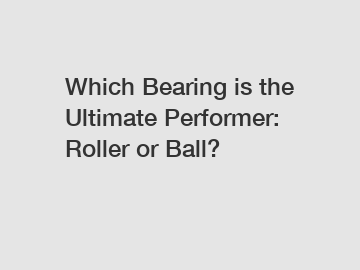Which Bearing is the Ultimate Performer: Roller or Ball?
Which Bearing is the Ultimate Performer: Roller or Ball?
Bearings play a crucial role in various types of machinery or mechanical systems by allowing smooth and efficient movement of rotating parts. They reduce friction and ensure proper load distribution, maximizing performance and lifespan. Among the different types of bearings available, ball bearings and roller bearings are the most commonly used. But which one is the ultimate performer? Let's explore the characteristics and advantages of each to find out.
Ball Bearings: Precision and Speed.

Ball bearings are known for their simplicity and high-speed capabilities. Consisting of hardened steel balls held within a rotating raceway, they excel in low-load applications that demand high precision and quick rotation. The round shape of the balls provides point contact, minimizing friction, and enabling smooth movement.
One of the key advantages of ball bearings is their ability to handle axial loads (force applied parallel to the bearing axis). Due to their design, ball bearings can support both radial (force applied perpendicular to the bearing axis) and axial loads simultaneously. This makes them well-suited for applications such as electric motors, automotive systems, and household appliances.
Roller Bearings: Durability and Load Capacity.
Roller bearings, on the other hand, are designed to bear heavy loads and handle larger forces. Instead of spherical balls, these bearings utilize cylindrical or tapered rollers that distribute the load over a larger surface area. This design allows roller bearings to handle higher radial and axial loads with improved durability.
The surface contact area of roller bearings is greater compared to ball bearings. The line contact provided by the cylindrical or tapered shape distributes the load more effectively, reducing the pressure on individual points. Consequently, roller bearings are commonly used in applications where heavy machinery and equipment are involved, such as construction machinery, mining equipment, and industrial gearboxes.
Choosing the Right Bearing for the Right Application.
When it comes to selecting the perfect bearing for a specific application, it is essential to consider various factors such as load type, speed requirements, and environmental conditions. While ball bearings excel in high-speed and precision applications, roller bearings are preferred for heavy-duty machinery and applications that endure substantial loads.
In some cases, a combination of both ball and roller bearings may be used in a single system to optimize performance. For example, a machine with multiple moving parts might require ball bearings at certain locations for high-speed motion, while incorporating roller bearings in areas that deal with heavy loads.
Ultimately, the choice between roller and ball bearings depends on the specific needs and requirements of the application. Consulting with a bearing specialist or engineer can provide valuable insight and guidance in selecting the most appropriate bearing solution.
Contact Us for Bearing Solutions.
Whether you are looking for high-speed ball bearings or durable roller bearings, our team of experts is here to assist you. We offer a wide range of bearings suitable for various industries and applications. Contact us today to discuss your specific requirements and find the ultimate performer for your machinery.
If you are looking for more details, kindly visit release bearing function, deep groove ball bearing advantages, function of clutch release bearing.
166
0
0


Comments
All Comments (0)